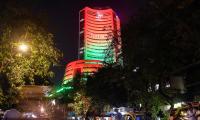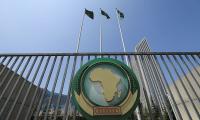Market Correction: US Inflation, Middle East Tensions Drag Stocks Lower
Global uncertainties, including the Iran-Israel conflict and US inflation, have led to a market correction, dragging Indian equity markets lower from record highs.

New Delhi, Apr 17 (PTI) Global uncertainties, mainly escalating tensions between Iran and Israel, have led to a massive correction in the equity markets in the last three days after a record-shattering rally that saw the BSE Sensex crossing the historic 75,000 mark last week.
Hotter-than-expected US inflation data fuelled concerns that the Federal Reserve will hold back on delivering the cuts to interest rates. Also, foreign fund outflows and profit-taking contributed to the correction in the equity markets.
In the past three days, the BSE benchmark tanked 2,094.47 points or 2.79 per cent.
Investors' wealth tumbled Rs 7.93 lakh crore in the three days of the market crash amid simmering tensions in the Middle East and weak global trends.
"The heavy correction in the market can be attributed to several factors, including the escalating tensions between Iran and Israel, which have heightened geopolitical uncertainties and prompted risk aversion among investors.
"Additionally, the Federal Reserve's hawkish stance on inflation has shifted interest rate expectations, dampening hopes for significant interest rate cuts. Rising geopolitical tensions in the Middle East have contributed to the correction, as investors move towards safer assets amidst uncertainty. These factors combined have led to a significant correction in the market after a period of record rally," said Suman Bannerjee, CIO of hedge fund Hedonova.
The BSE Sensex hit its all-time peak of 75,124.28 on April 9. The index breached the historic 75,000 mark for the first time ever on the same day.
On April 10, the 30-share BSE benchmark settled above the 75,000 mark for the first time.
The market capitalisation of BSE-listed companies went past the coveted Rs 400 lakh crore mark for the first time ever on April 8.
From February 29 to April 10, the BSE benchmark jumped 2,537.85 points or 3.50 per cent.
However, from April 12 onwards the markets have been falling.
"The recent heavy correction in the market can be attributed to geopolitical tensions. Additionally, anticipation of delayed rate cuts in the USA has added pressure. These factors have collectively contributed to the downturn following a period of record rally in the markets," Arvinder Singh Nanda, Senior Vice President, of Master Capital Services Ltd, said.
Stock markets are closed on Wednesday for Ram Navami.
Swastika Investment Ltd Managing Director Sunil Nyati said the market corrected due to selling in the broader market, weak global cues, selling by Foreign Institutional Investors (FIIs), upcoming US Federal Reserve meeting and rising crude oil prices.
When there is widespread selling across various sectors and stocks, it can lead to overall market decline as investors' sentiment turns negative, Nyati said.
"India is a major importer of crude oil, and higher oil prices can negatively affect the country's trade balance, inflation, and fiscal situation," Nyati added.
Last month, the 30-share BSE Sensex climbed 1,151.05 points or 1.58 per cent.
"Markets extended their losing streak for the third straight session on the back of weak global cues as a sharp rise in US bond yields due to rising Middle East tensions have made equity markets less attractive and prompted investors to resort to profit-taking. Investors are fearing that the ongoing conflict could fuel buoyancy in crude oil prices and in turn, weigh on inflation," Prashanth Tapse, Senior VP (Research), Mehta Equities Ltd, said.
Bannerjee said the Q4 earnings report will be crucial as solid results could reignite the rally, while disappointments might trigger further corrections.
"Additionally, the Federal Reserve's policy actions regarding interest rates will be closely monitored for any changes in their stance. Furthermore, global economic health and significant developments, especially geopolitical tensions, such as the Iran-Israel conflict, can significantly impact investor sentiment and market movements," he said.
"The near-term direction of the Indian stock market can be influenced by several key factors - performance of global markets, Lok Sabha election results, foreign investors trading activity, upcoming decisions by the US Federal Reserve regarding interest rates and fluctuations in oil prices," Nyati said.
Hotter-than-expected US inflation data fuelled concerns that the Federal Reserve will hold back on delivering the cuts to interest rates. Also, foreign fund outflows and profit-taking contributed to the correction in the equity markets.
In the past three days, the BSE benchmark tanked 2,094.47 points or 2.79 per cent.
Investors' wealth tumbled Rs 7.93 lakh crore in the three days of the market crash amid simmering tensions in the Middle East and weak global trends.
"The heavy correction in the market can be attributed to several factors, including the escalating tensions between Iran and Israel, which have heightened geopolitical uncertainties and prompted risk aversion among investors.
"Additionally, the Federal Reserve's hawkish stance on inflation has shifted interest rate expectations, dampening hopes for significant interest rate cuts. Rising geopolitical tensions in the Middle East have contributed to the correction, as investors move towards safer assets amidst uncertainty. These factors combined have led to a significant correction in the market after a period of record rally," said Suman Bannerjee, CIO of hedge fund Hedonova.
The BSE Sensex hit its all-time peak of 75,124.28 on April 9. The index breached the historic 75,000 mark for the first time ever on the same day.
On April 10, the 30-share BSE benchmark settled above the 75,000 mark for the first time.
The market capitalisation of BSE-listed companies went past the coveted Rs 400 lakh crore mark for the first time ever on April 8.
From February 29 to April 10, the BSE benchmark jumped 2,537.85 points or 3.50 per cent.
However, from April 12 onwards the markets have been falling.
"The recent heavy correction in the market can be attributed to geopolitical tensions. Additionally, anticipation of delayed rate cuts in the USA has added pressure. These factors have collectively contributed to the downturn following a period of record rally in the markets," Arvinder Singh Nanda, Senior Vice President, of Master Capital Services Ltd, said.
Stock markets are closed on Wednesday for Ram Navami.
Swastika Investment Ltd Managing Director Sunil Nyati said the market corrected due to selling in the broader market, weak global cues, selling by Foreign Institutional Investors (FIIs), upcoming US Federal Reserve meeting and rising crude oil prices.
When there is widespread selling across various sectors and stocks, it can lead to overall market decline as investors' sentiment turns negative, Nyati said.
"India is a major importer of crude oil, and higher oil prices can negatively affect the country's trade balance, inflation, and fiscal situation," Nyati added.
Last month, the 30-share BSE Sensex climbed 1,151.05 points or 1.58 per cent.
"Markets extended their losing streak for the third straight session on the back of weak global cues as a sharp rise in US bond yields due to rising Middle East tensions have made equity markets less attractive and prompted investors to resort to profit-taking. Investors are fearing that the ongoing conflict could fuel buoyancy in crude oil prices and in turn, weigh on inflation," Prashanth Tapse, Senior VP (Research), Mehta Equities Ltd, said.
Bannerjee said the Q4 earnings report will be crucial as solid results could reignite the rally, while disappointments might trigger further corrections.
"Additionally, the Federal Reserve's policy actions regarding interest rates will be closely monitored for any changes in their stance. Furthermore, global economic health and significant developments, especially geopolitical tensions, such as the Iran-Israel conflict, can significantly impact investor sentiment and market movements," he said.
"The near-term direction of the Indian stock market can be influenced by several key factors - performance of global markets, Lok Sabha election results, foreign investors trading activity, upcoming decisions by the US Federal Reserve regarding interest rates and fluctuations in oil prices," Nyati said.
You May Like To Read
TODAY'S MOST TRADED COMPANIES
- Company Name
- Price
- Volume
- Vodafone-Idea-L
- 11.35 (+ 0.89)
- 45672238
- Mangalam-Industrial
- 0.91 (+ 1.11)
- 16648817
- Harshil-Agrotech
- 0.61 (+ 8.93)
- 15737839
- Pradhin
- 0.27 (+ 3.85)
- 11959332
- Alstone-Textiles
- 0.29 ( 0.00)
- 10219430






